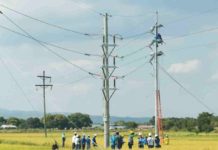MANILA – The Malacañang on Monday submitted to Congress the proposed P3.757-trillion budget for next year, the same day President Rodrigo Duterte delivered his third State of the Nation Address (SONA).
Budget secretary Benjamin Diokno said in a text message that they had forwarded copies of the 2019 National Expenditure Program to the Senate and House of Representatives.
Both houses of Congress will then hold hearings and pass a reconciled version of the bill to be submitted to the Palace for the President’s signature.
“For Fiscal Year 2019, we submit for your perusal and approval, a national budget that will amplify the forces and resources to effectively and efficiently build our nation, in order to draw more of our people from the clutches of poverty and maintain law and order, so everybody lives in peaceful co-existence,” Duterte said in his budget message.
“This 2019 budget, designed to be a modern and open budget for accountability and service delivery, will take us from dream to action, from possibility to reality, from building to being,” he added.
Next year’s proposal is slightly lower than 2018’s P3.767-trillion budget, the country’s biggest to date.
Education and infrastructure remain the top spending priority of the government for next year.
The third budget crafted under the Duterte presidency gives the education sector – comprising the Department of Education, State Universities and Colleges, Commission on Higher Education, and Technical Education and Skills Development Authority – the largest share of P659.3 billion, up 12.3 percent or P72.2 billion from its cash-based equivalent of P587.1 billion under the 2018 budget.
The Department of Public Works and Highways gets the second largest allocation of P555.7 billion, up 68.3 percent, or P225.5 billion.
The Department of the Interior and Local Government is getting the third largest allocation of P225.6 billion, up 30.9 percent, or P53.3 billion.
The Department of National Defense came in fourth with a budget of P183.4 billion, an increase of P46.9 billion, or 34.4 percent
The amount will bolster security and promote peace and order in the country, according to the DBM.
Social Welfare – composed of the Department of Social Welfare and Development and the budget for unconditional cash transfers under the Land Bank of the Philippines – is the fifth largest with an allocation of P173.3 billion, up 5.4 percent or P8.9 billion.
Health, which combines the budgets of the Department of Health and the Philippine Health Insurance Corporation, has an allocation of P141.4 billion.
The Department of Transportation has the seventh-highest allocation of P76.1 billion, up 89.3 percent or P35.9 billion. It will address the need for efficient and comfortable mass transport systems all over the country to ease the lives of Filipino commuters.
The Department of Agriculture gets a budget of P49.8 billion, up 22.4 percent or P9.1 billion.
The allocation is intended to promote agricultural development and improve the lives of people in the rural sector, the DBM said.
The judiciary has been given the ninth largest allocation of P37.3 billion, up 5.4 percent or P1.9 billion, to ensure the swift and fair administration of justice, according to the Budget department.
The allocation for the Autonomous Region in Muslim Mindanao is P32.3 billion, up 32.4 percent or P7.9 billion. It supports livelihood, peace and order, and rural development projects in the region, the DBM said.
Per sector allocation, the share of social services in the proposed 2019 budget was slightly trimmed to 36.7 percent from 37.8 percent.
Economic services were also reduced to 28.4 percent from 30.6 percent, while the share of general public services was increased to 18.9 percent from 17.4 percent.
Provision for debt burden also increased to 11 percent from 9.8 percent last year, while defense was increased to 5 percent of the total from 4.3 percent in 2018.
The 2019 general appropriations would be the first cash-based budget of the government, with one year validity and a three-month extension after the fiscal year for agencies to settle payments for the goods and services delivered. (GMA News)



